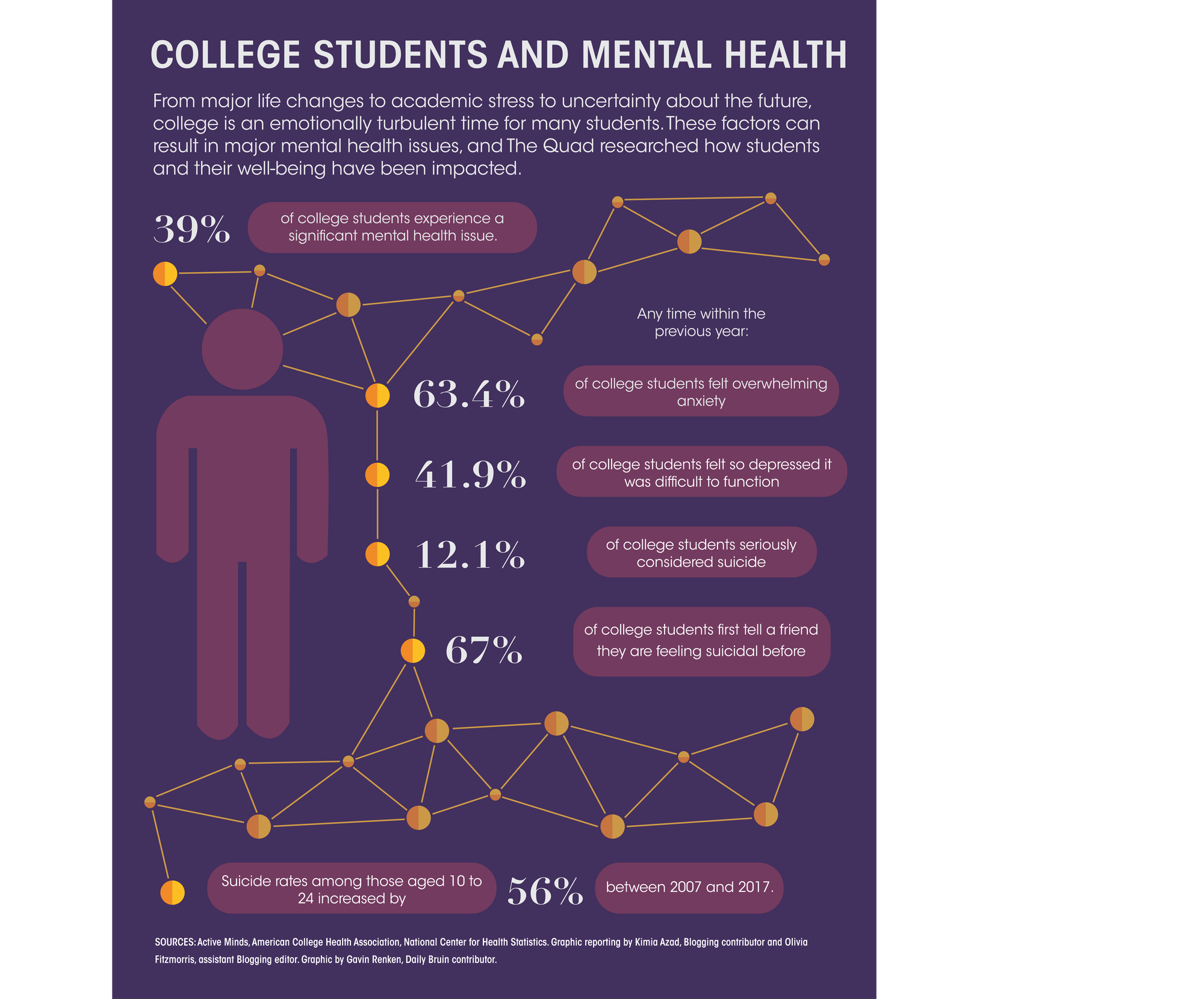The Quad: Looking into impacts of mental health jokes among college students

(Gavin Renken/Daily Bruin)

By Kimia Azad
March 12, 2020 3:03 p.m.
In August 2019, the question, “What happens if you get hit by a bus on campus?” was trending on Google search results.
It’s an ongoing, rumor-fuelled joke for American college students: If you get hit by a vehicle on campus, you will get your tuition paid.
This running bit became a reality for University of Illinois at Urbana-Champaign, student and Twitter user Miranda Sun, who went viral for sharing an image of herself at the hospital after having been hit by a bus on her college campus.
“Yesterday, I finally achieved what every single college student in America has dreamed of, yet can only hope will happen to them,” Sun wrote on Twitter. “That’s right. I got run over by a bus on campus.”
The tweet has garnered more than 68,000 retweets, almost 378,000 likes and thousands of comments since it was posted around seven months ago.
One of the most liked comments on the viral post teases at how relatable Sun’s sentiment is for college students.
“I’m so glad you’re okay, but also congrats,” the user wrote in response to the tweet. “That is really an accomplishment. I tried for years to no avail.”
The ongoing quip is one of many offshoots of the same idea: Young people, particularly college students, making jokes about mental health and dying.
At first glance, these jokes seem concerning, however, in some ways, they may actually provide a commiserating platform to a generation more stressed than ever.
First-year economics student Nima Ashrafi mentioned he tends to hear these jokes daily.
“Every time I walk down Bruin Walk, I hear people express their lack of patience for the (De Neve) stoplight by saying that they would be OK with a car hitting them,” Ashrafi said.
Ashrafi added that when he first came to UCLA, he was surprised by how often his peers would express themselves in such dark ways. Now in his second quarter, he said he has grown numb to the dark remarks.
Not only have these jokes become more prevalent on campus, but they have also become prevalant on the internet and within meme culture.
Popular social media accounts, such as the UCLA meme page on Facebook, often make light of the difficulties college students face. Many jokes point to the stressors of college life: the impossibility of balancing heavy course loads with career preparation and a social life, all while maintaining a high GPA and getting eight hours of sleep per night.
One popular Instagram post, circulated by a highly followed college meme page, proclaims death as an escape to the burden of student loan debt.
Other memes go further into the negative impact college stressors can have on students, describing mental breakdowns, episodes of depression and suicidal thoughts.
A meme posted on Tumblr with more than 3,000 notes discusses one’s ongoing experience with suicidal thoughts. Paired with an image of a cartoon character sleeping, the caption reads: “Me going to sleep at 3 am knowing my suicidal thoughts are getting progressively worse and I’m doing nothing to stop them.”
Deprecative jokes tend to come to life in stressful classroom settings.
During times of high pressure, such as midterm and final exam weeks, Ashrafi said he tends to hear students joke not only about their mental health, but also about how they would rather kill themselves than take their exam.
While the dark humor may manage to get laughs in the real world and likes online, the trend is disturbing alongside what news sources have called a campus mental health “epidemic.”

A 2018 study from the American College Health Association found that 41.9% of participating students said they felt so depressed that it was difficult to function at some point in the previous year. The same study found that 63.4% of college students had felt overwhelming anxiety in the last year.
Left untreated, mental health issues can lead to serious consequences.
The ACHA reports that suicide rates among teens and college-aged youth have tripled since the 1950s. In addition, the World Health Organization has listed suicide as the second-leading cause of death for youth aged 15-29 worldwide.
For some students, including third-year atmospheric and oceanic studies student Melinda Berman, the jokes have become a part of college culture.
“I definitely think those jokes are a lot more normalized now,” Berman said. “Because it doesn’t really scare me to hear stuff like that.”
Chloe Rosenstock, a first-year psychology student and peer counselor at Peer Assistance and Wellness Support at UCLA, believes college students’ comedic and open approach to mental health may actually be therapeutic.
“I think it’s used as a coping mechanism to make situations seem less serious and volatile,” Rosenstock said.
Psychologists have long known humor to improve overall well-being and to be a natural way to reduce and relieve stress. Thus, it’s possible these dark jokes help students practice stress relief and even perhaps form a community over shared hardships.
UCLA adjunct assistant professor in psychiatry Alexander Korb describes the effects of humor on well-being.
“Humor has always been around as a coping mechanism,” Korb said. “It’s much more productive to laugh about something than just be completely overwhelmed by it.”
However, no one coping mechanism is always beneficial.
“(Joking about mental health) is enough to keep (people) from feeling worse, but it doesn’t actually compel them to take action to solve the problem” Korb said.
While memes and quips may help individuals express themselves and feel heard, Korb adds, they can also normalize suicidal thoughts and emotional struggles instead of destigmatizing them.
Overexposure to these jokes may persuade individuals that their struggles are commonplace enough to not warrant professional help, Korb said. Inversely, the same jokes may also motivate an individual to seek support or reach out.
For now, mental health jokes may be becoming more prevalant not only in real life, but also online.
UCLA continuing lecturer in communication and licensed psychologist Dee Bridgewater said a comedic approach to mental health may be deconstructive to those who are on the receiving end of the joke.
Not only can this humor trivialize affected individuals, Bridgewater adds, but it also can make it difficult to distinguish a joke from a cry for help.
College campuses have introduced initiatives to bolster student well-being and work to catch up with a rising number of college students who are reporting having anxiety and depression.
UCLA launched the Depression Grand Challenge in 2012, which uses a peer-to-peer network to connect students with graduate students trained in emotional support and clinical psychology. In addition, the university offers resources such as clinical help from Counseling and Psychological Services and peer-to-peer support groups such as Wazo Connect, for students experiencing mental health issues.
Yet, students continue to experience the struggles of college life day in and day out. On some days, the stress may be overwhelming and students may find themselves laughing at a dark joke and bonding over their plight. All jokes aside, it’s important to think critically about what this humor is communicating.
At the end of the day, we don’t want people to be hurt by moving vehicles, comedic or otherwise.


